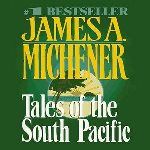
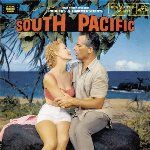
A look at a song from a Broadway musical that dealt with racial issues before the civil rights era, after the jump ……
Being away for several days, I had little time to think of a subject for this week.
NPR came to the rescue: with its Race Card project, seeking input from listeners in six words. And it just so happens that a famous song from sixty-five years ago touched on racism: ten years after Strange Fruit – albeit not as explosive – yet which still caused a reaction from the Usual Suspects (perhaps as intended) years before the civil rights movement came into being.
I had heard the song before, but it was this radio essay that made me listen to it again … for the first time.
Besides his classical and opera records: among the albums my father had (yet never listened to after he became a parent, and thus kept in the basement) were ones by Xavier Cugat and other easy listening albums … always with some pretty woman on the cover (who often had nothing to do with the performers). As I grew up listening to rock, jazz and blues (and still do) I, of course, didn’t want anything to do with my father’s records. Whoever created the “Not your father’s _ _ _ _” theme had it right, as far as I was concerned.
But one album he had that I wish I had listened to was the soundtrack album to the Broadway hit South Pacific – and in particular, the song You’ve Got to Be Carefully Taught – which were the six words many NPR listeners cited. Others have blogged about this song before, delving more into the racial matters that the song addresses. As is my wont: I’d like to focus on the back-story of the tune … trying to give a flavor of the times.
Its origin is the Pulitzer Prize-winning novel by James Michener entitled Tales of the South Pacific – which was optioned for a Broadway musical by the legendary Richard Rodgers – Oscar Hammerstein duo – that opened in 1949. It went on to win several Tony Awards, and was made into a Hollywood film in 1958 (whose cast included future TV star Ray Walston).
And the soundtrack album had other, more popular songs such as Some Enchanted Evening and I’m Gonna Wash That Man Right Outa My Hair – both of which are still sung in cabarets, piano bars and pubs to this day.


Earlier that decade, Rodgers & Hammerstein had huge hits with Oklahoma! (1943) and Carousel (1945) – which covered more conventional topics for musicals. But this production delved into a more delicate topic as James Michener discussed racial differences in his novel – yet did not make it the central theme as the play did (but of which Michener approved).
Nine years after its premiere, Oscar Hammerstein told Mike Wallace in a TV interview:
“South Pacific had two love stories in it. They both concern, in a different way, race prejudice. What we were saying was that … all this prejudice that we have is something that fades away in the face of something that’s really important.”
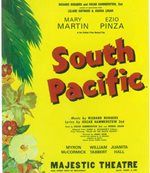
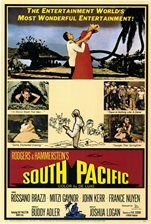
The two characters involved with interracial relationships are a Navy nurse (named Nellie Forbush) and a young Marine (named Lt. Joe Cable). Nellie Forbush falls in love with a Frenchman but is repulsed when she learns that he was once married to a Polynesian woman and had two mixed-race children. Joe Cable falls in love with a Tonkinese woman on the island (although their differences preclude a happy ending). And it is the character of Joe Cable who sings Carefully Taught … after first saying that racism is not innate (the song will appear at the end of this writing).
The context for the play’s theme are the late 40’s, in the post-war Red Scare. First, one of those who wrote to NPR noted how her family was supposed to ‘hate the Japs’, despite loving the song in question.
Then add the post-war Red Scare: the Alger Hiss trial, the Soviet Union acquiring the atom bomb, the Who Lost China? question being beaten over people’s heads and the work not only of Senator Joe McCarthy but the House Un-American Activities Committee (HUAC) led by Rep. Martin Dies … all of which left liberals reeling somewhat.
One essayist noted that a way for liberals to declare themselves anti-Communist (yet not abandon their principles) was to assert that Communism could not take hold in a country with both economic prosperity and racial equality – meaning both were worth fighting for. And this especially true of American Jews, who often dabbled in left-wing politics and were singled-out by Rep. Dies (photo left, below) and his successor, Rep. John Rankin (photo right, below).


This is where lyricist Oscar Hammerstein was coming from. One historian noted that Hammerstein had ‘tucked liberal messages’ into his previous works.
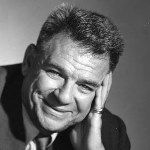
As noted, the development of South Pacific into a play had a quality production crew, and enough quality musical material to ensure at least a successful run on Broadway (if not foreseeing the major hit it would become). But in tryouts, Rodgers & Hammerstein were advised constantly to drop Carefully Taught, lest it ruin a play that could stand on its own – and cause problems if the show ever wanted to leave Manhattan to go out into Middle America on tour.
But they stuck to their principles, with the money quote coming from James Michener himself:
“The authors replied stubbornly that this number represented why they had wanted to do this play and that even if it meant the failure of the production: it was going to stay in.”
And while South Pacific dealt with issues of Anglo-Asian racial matters, it did not fail to escape the notice of US racial bigots. When it went on tour in Georgia, for example, legislators introduced a bill outlawing any entertainment they claimed was ‘inspired by Moscow’. One legislator said that songs justifying interracial marriage was a threat to the American way of life and another – Rep. David C. Jones – wrote in a letter, “We in the South are a proud and progressive people. Half-breeds cannot be proud.”
Oscar Hammerstein responded thusly:
I am surprised by the idea that anything kind and humane … must necessarily originate in Moscow.
Today, South Pacific is popular wherever musical theater is performed – a recent London production (photo left) and a 2001 made-for-TV version (photo right) can attest to its longevity.
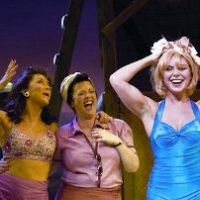
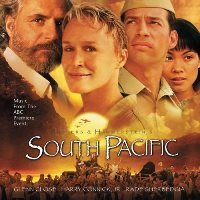
Let’s close with a more modern recording of the song … and at less-than-a-minute this clip won’t take long to listen to. If all you know of the actor Mandy Patinkin is The Princess Bride, then you are in for a treat below.
You’ve got to be taught to hate and fear
You’ve got to be taught from year to year
It’s got to be drummed in your dear little ear
You’ve got to be carefully taughtYou’ve got to be taught to be afraid
Of people whose eyes are oddly made
And people whose skin is a different shade
You’ve got to be carefully taughtYou’ve got to be taught before it’s too late,
Before you are six, or seven or eight
To hate all the people your relatives hate
You’ve got to be carefully taught
8 comments